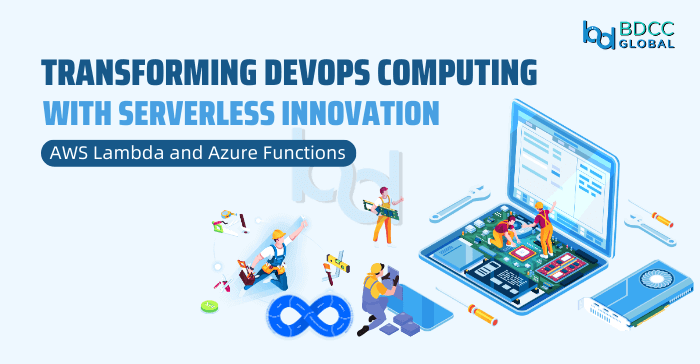
Are you tired of managing your application infrastructure? Do you want to focus more on DevOps computing rather than dealing with the complexities of traditional computing environments? If so, Serverless Computing is here to revolutionize your application deployment approach.
“The Serverless Computing model enables developers to build, deploy, and scale multiple applications without configuring or managing the underlying infrastructure.”
You can use Serverless Computing capabilities through platforms like Microsoft Azure Functions and Amazon AWS Lambda. If you need more exposure to these platforms and their compatibility to support DevOps practices, keep reading this article!
AWS Lambda Usage & Capabilities in DevOps Computing
AWS Lambda is Amazon’s serverless platform that offers the following capabilities to support various DevOps practices:
Event-Driven Architecture
AWS Lambda is designed for event-driven applications, making it ideal for microservices architectures and event-based workflows.
Multiple Language Support
With AWS Lambda, you can write your functions in any programming language like Python, CloudFormation, Java, C#, and more.
Seamless Integration
You can integrate AWS Lambda with other cloud services like Amazon S3, API Gateway, VPC, DynamoDB, and more.
Scalability and Auto Scaling
AWS Lambda supports cloud migration operations. Once you move the applications to containers, AWS auto-scales your applications in response to incoming request volumes. It ensures optimal performance and cost efficiency.
Versioning and Rollbacks
AWS Lambda allows you to version your functions, enabling easy rollbacks and managing multiple versions of your code.
Azure Functions Usage & Capabilities To Adapt DevOps Practices
Azure Functions is Microsoft’s serverless computing platform that supports DevOps practices with the following features:
Flexible Triggers and Bindings
Azure Functions supports many triggers, including HTTP requests, timers, and queues for other Azure services. It also provides bindings for smooth integration with various external systems.
Seamless Integration with DevOps
DevOps consulting companies can use Azure Functions alongside the Azure DevOps platform. Azure Functions seamlessly integrates with other Azure services like Azure Storage, Azure Event Hubs, Azure Cosmos DB, and more.
Rich Development Environment
Azure Functions provides a rich development experience with tools like Azure Functions Core Tools, Visual Studio Code, and Azure Portal UI. It supports multiple programming languages, including JavaScript, C#, Python, PowerShell, etc. These make the software development process more accessible to the developers.
Hybrid Connectivity
Azure Functions offers hybrid connectivity capabilities like Azure ExpressRoute to connect to on-premises resources securely. You can easily integrate the on-premise network components into your serverless workflows.
Utilization of Serverless Computing in DevOps
We have discussed AWS Lambda and Azure Functions as the most popular serverless computing platforms. Now we will explore how Serverless Computing fits with DevOps computing practices.
Environment Isolation
Serverless computing ensures complete isolation between different application components. It handles large-scale application data using data processing services like AWS Glue and Azure Data Factory. Hence, it becomes easier to manage complex microservices architectures and data pipelines.
Continuous Integration and Delivery (CI/CD)
Serverless computing integrates with popular CI/CD tools like AWS CodePipeline, Azure DevOps, and Jenkins. These DevOps tools allow you to automate the entire code deployment process. You can frequently release code changes faster through CI/CD pipelines.
Infrastructure as Code (IaC)
With tools like ARM and AWS CloudFormation, DevOps consultants can define their serverless components. They can perform version-controlled infrastructure provisioning with smooth environment replication.
Monitoring and Logging
Serverless platforms provide built-in monitoring and logging capabilities. You can leverage tools like AWS CloudWatch and Azure Monitor to monitor and troubleshoot your application behavior effectively.
Summing Up
AWS Lambda and Azure Functions are revolutionizing DevOps computing capabilities in the serverless era. DevOps teams can scale and deploy applications more efficiently with these serverless platforms. Serverless computing not only simplifies DevOps computing operations but also increases development speed. Whether you choose AWS Lambda or Azure Functions, serverless computing offers a promising future for DevOps practices in 2023!
FAQs
#1 Is serverless computing suitable for all types of applications?
Serverless computing is well-suited for event-driven architecture and microservices. There may be better fits for long-running or highly-predictable workloads.
#2 Which is better? AWS Lambda or Azure Functions?
AWS Lambda and Azure Functions both offer different serverless computing features and capabilities. You can expect the best functionalities from both platforms from the most popular cloud providers.
#3 How does serverless computing handle application security and compliance?
Serverless platforms like AWS Lambda and Azure Functions provide secured data management with features like authentication, encryption, and access control. They maintain industry standards and regulations to comply 100%.
#4 What are the cost considerations for serverless computing?
If you have availed of DevOps consulting services, the professionals will manage the cost-planning to implement Serverless Computing. Otherwise, you can consider factors such as function execution time, memory usage, and data transfer costs to estimate the cost.
#5 Can I integrate serverless functions with databases and external services?
You can integrate serverless functions with various services and databases through APIs and SDKs. AWS and Azure provide easy integration support for seamless communication between applications and external systems/databases.
BDCC
Latest posts by BDCC (see all)
- Enhancing Security Posture with Azure’s AI-Driven Threat Detection - April 15, 2025
- Why Golang is Becoming the Go-To Language for DevOps Engineers - April 11, 2025
- Azure Arc: Extending Azure Services to Hybrid and Multi-Cloud Environments - April 8, 2025

